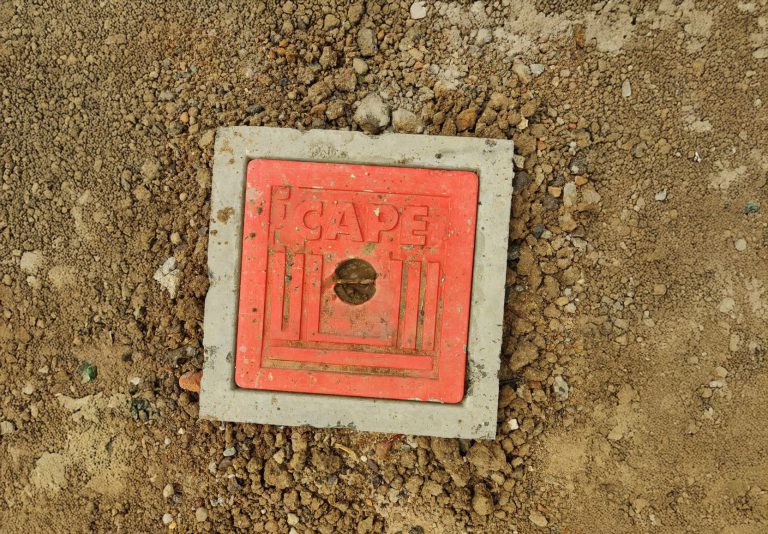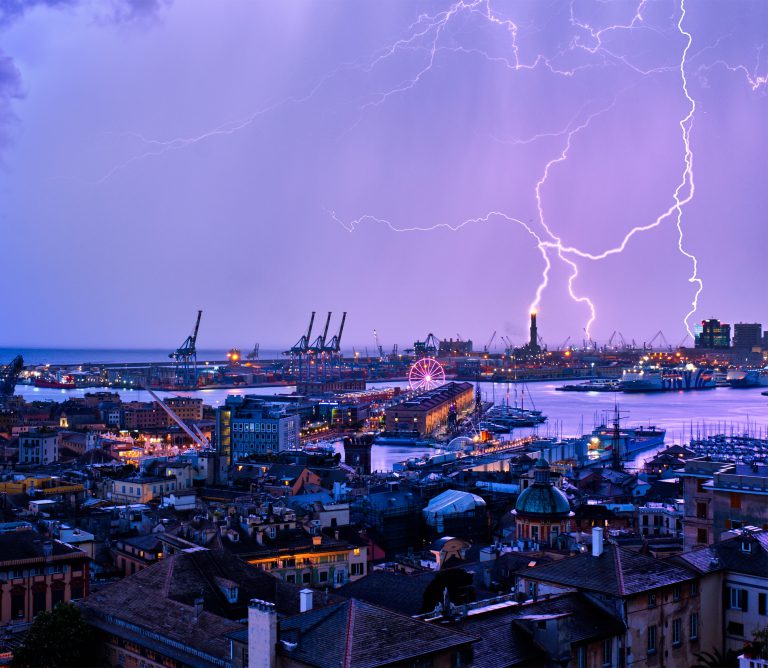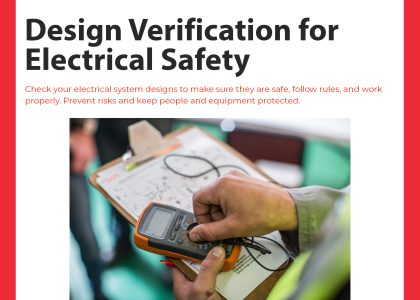The Importance of a Comprehensive
Lightning Protection Audit
In today’s world, lightning strikes pose a significant risk to buildings, infrastructure, and people. The installation of lightning protection systems (LPS) is essential for mitigating these risks. However, even the best-installed systems require regular audits to ensure they continue to perform optimally over time. At Cape Electric, we provide thorough lightning protection audits that ensure compliance with the recently revised IEC 62305 standard, updated after 14 years, while also addressing specialized needs for high-risk environments such as oil and gas industries.
Why is a Lightning Protection Audit Essential?
Lightning protection systems are designed to safeguard buildings and structures from the devastating effects of lightning strikes. However, the nature of these systems can be compromised over time by environmental factors, equipment aging, or corrosion. A comprehensive lightning protection audit helps identify and address any risks before they lead to serious consequences.
This is especially important for explosive areas like oil and gas facilities. Such environments require far more detailed protection due to the inherent risks associated with flammable materials and volatile zones. Cape Electric takes these factors into consideration during audits, providing tailored solutions based on the type of storage material, the structure of the storage tank, and the specific zone of the explosive region.
Compliance with IEC 62305: Revised After 14 Years
The IEC 62305 standard has been the global benchmark for lightning protection, and its recent revision after 14 years introduces critical updates that reflect the latest advancements in lightning protection technology and safety. For high-risk sectors like oil and gas, ensuring compliance with these revised standards is crucial to safeguarding facilities against the potentially catastrophic impact of lightning strikes.
During an audit, Cape Electric will:
- Assess risk factors based on updated geographical and environmental data,
- Evaluate system design for all critical parts of the structure, especially focusing on explosive zones,
- Check for corrosion and degrading factors that could compromise system performance,
- Perform compliance checks in line with the latest IEC 62305 standard.
Special Consideration for Explosive Areas
In industries like oil and gas, where flammable materials are stored in high-risk environments, the need for precision in lightning protection is even more critical. During our audits, we apply additional layers of scrutiny, offering detailed protection measures that consider:
- The type of storage material being housed, including its flammability and reactivity to electrical surges,
- The structure of storage tanks, evaluating whether they are above ground, underground, Floating tanks etc
- The zone classification of the explosive area, such as Zone 0, Zone 1, or Zone 2, to determine the specific risk level and adjust the protection measures accordingly.
Earth Electrode Lightning Performance Testing
A critical component of any lightning protection system is its grounding or earth electrode system. In explosive areas, proper grounding is essential to ensure that lightning strikes or electrical surges are safely dispersed into the earth without causing sparking or fires.
At Cape Electric, we use specialized meters that simulate lightning impulse currents to test the performance of earth electrodes under various conditions:
- 10/350 µs (representing a direct lightning strike),
- 8/20 µs (representing surge currents),
- 4/10 µs (used for fast transient testing).
For explosive regions, this is especially important, as any failure in the earthing system could result in a catastrophic event. If we detect any degradation due to corrosion or environmental factors, we will recommend rectifications to enhance the earthing system’s performance, ensuring it remains fully compliant with the IEC 62305 standard.
Data Analysis: Standard Measurements vs Impulse Current Testing
To demonstrate why impulse current testing is essential, let’s review some sample data:
Type of electrode (ring/rod) | Electrode resistance in (normal meter) | Impulse Current meter (Zs) | ||
4/10 μs | 8/20 μs | 10/350 μs | ||
Below Values in Ω | ||||
Rod | 2.97 | 4.5 | 3.3 | 3 |
Rod | 1.86 | 2.8 | 2.2 | 2.1 |
Rod | 5.82 | 7.9 | 6.8 | 6.3 |
Rod | 2.87 | 5.1 | 3.7 | 3.6 |
Rod | 2.41 | 7 | 4 | 4.2 |
Rod | 2.16 | 5.7 | 3.8 | 3.8 |
Rod | 7.71 | 10.5 | 8.1 | 7.7 |
Rod | 8.17 | 15.3 | 11.5 | 10.4 |
Rod | 8.15 | 11.5 | 9.5 | 8.9 |
Rod | 9.2 | 20.2 | 15.3 | 12.8 |
Rod | 6.58 | 7.7 | 7 | 6.7 |
As you can see from the data, the impulse current resistance (Zs) values are significantly higher than the standard resistance values measured by a normal meter. For instance, an electrode with a normal resistance of 9.2 Ω shows much higher values under impulse conditions, reaching 20.2 Ω for 4/10 µs. This clearly illustrates how traditional measurements may not reflect the true performance of a lightning protection system during a real lightning strike.
If our audit determines that your LPS is non-compliant, especially in high-risk areas such as oil and gas facilities, we provide more than just a list of issues. At Cape Electric, we will:
- Perform a full risk assessment based on the latest IEC 62305 standard and the specific risks posed by your facility’s location, explosive materials, and storage structures,
- Redesign the lightning protection system to include enhanced measures for high-risk zones, considering material type, storage tank characteristics, and zone classification,
- Install the upgraded and compliant system, ensuring maximum protection for your facility.

Conclusion
The recent revision of the IEC 62305 standard, after 14 years, underscores the importance of conducting thorough lightning protection audits. For industries like oil and gas, where explosive risks are prevalent, Cape Electric offers specialized solutions tailored to the unique demands of your environment. Incorporating advanced testing like impulse current measurements ensures that your system is fully compliant and capable of protecting your facility during actual lightning strikes.
Stay safe with Cape Electric—your trusted partner in lightning protection for even the most high-risk environments.

Anandu Gopan
Application Specialist
Member in BIS and IEC Technical Committees
+91 9962555463
ag@capeindia.net
Cape Electric Pvt. Ltd.
Application Specialist
Member in BIS and IEC Technical Committees
+91 9962555463
ag@capeindia.net








